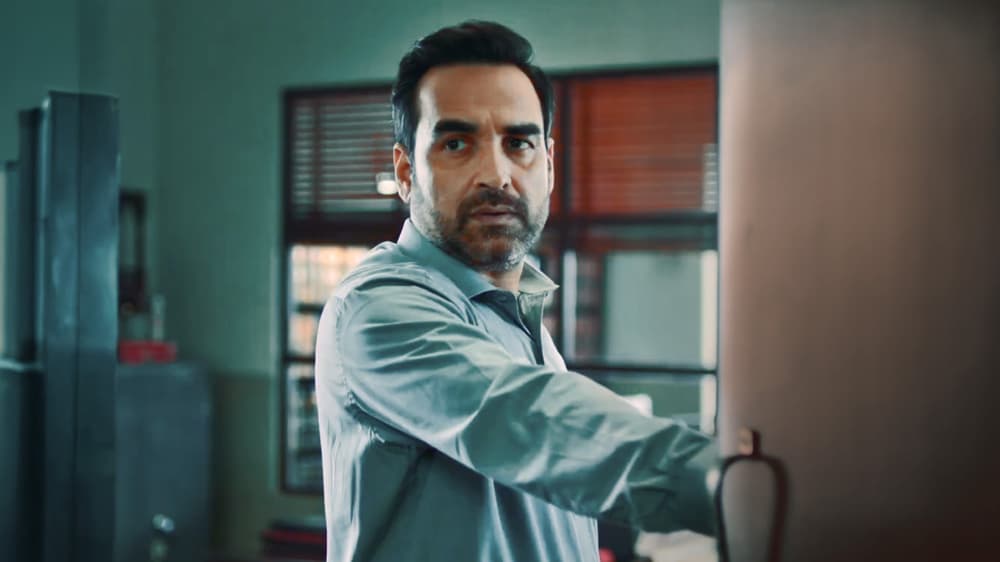Criminal Justice: Behind Closed Doors is a gripping legal drama that explores the hidden trauma of domestic abuse within a seemingly perfect family.
Criminal Justice: Behind Closed Doors Review: A silent home, A violent truth
Written by Sumit Kaushik

Criminal Justice: Behind Closed Doors is the pick of the new OTT fare, peeling off the onion layers of domestic life where lies are the default and silence hides pain. The legal thriller starts with Anuradha Chandra, a reserved and seemingly submissive wife, leaving everyone gaping as she falls ill and admits to attempting to murder her showbiz lawyer husband.
With every other episode, the series narrates a horrific story of psychological terror, emotional violence, and rape of wives—the matters put on the backburner within the holy walls of matrimony. With par excellence acting and an engaging story, the show cannot but invite the spectators to the filthy realities behind the sealed doors, thus becoming socially conscious and emotionally captivating.
Plot Twist Behind Closed Doors: When Silence Screams the Loudest
In Criminal Justice: Behind Closed Doors, the tale starts with a more jaw-dropping offense than a cliffhanger—demure and reserved wife of successful criminal attorney Bikram Chandra, Anuradha Chandra, brutally murders her husband.
Her very prompt confession begs questions, but something does not add up. Why would a woman who has never shown any aggressive tendencies be so brutally violent?
As activist lawyer Madhav Mishra takes over the defense, the layers of a heart-breaking home truth are peeled away. Hiding behind their luxurious lifestyle and poster-perfect facade is a shocking story of emotional abuse, psychological manipulation, and marital rape—hiding in plain sight.
The courtroom is now a battleground as much for legal as for the acceptance of a woman's unspoken torment.
The book fearlessly investigates the intricate nexus of justice, trauma, and social denial and asks the very pertinent question: Is it ever possible that real justice can be meted out if the system does not allow the voiceless to be heard?
Behind Closed Doors, Beyond the Obvious: A Haunting Courtroom Drama That Dares to Speak the Unspoken
Criminal Justice: Behind Closed Doors is more than legal fiction, though. It is a biting social critique burrowed inside a tightly woven story. The best of the new crop of Indian crime fiction and new OTT originals, this one is a blend of tradition with innovation by zeroing in on what usually gets left unsaid: the voice of a woman silenced in her own household.
The play begins on a melodramatic note—Anuradha Chandra (played with unsettling restraint by Kirti Kulhari) murders her husband, a top lawyer who is as famous as infamous, but admits to the offence without a fight.
It's not a cut-and-dry case of vice and punishment. It's a meticulously stripped onion of emotional rot, psychological violence, and marital rape—problems that Indian cinema and society have shied away from addressing for too long.
Kirti Kulhari gives a gently crushing performance. Her depiction of a bruised but not shattered woman is a masterclass in restraint and sensitivity of feeling. Pankaj Tripathi, in a comeback as the eccentric but caustic Madhav Mishra, again grounds the show with both weightiness and wit. His capacity to humanize the court of justice and strip bare uncomfortable truths is a signature of the series.
The supporting ensemble, playing Deepti Naval and Shilpa Shukla, bring depth and sophistication, playing out the range of society's attitudes—blind conformity to the patriarch and reverent sympathy for the survivor.
Writing That Cuts Deep:
The writing team is praised for approaching such sensitive subjects with maturity and tact. The dialogues are subtle but potent. The courtroom scenes are devoid of melodrama and focus on systematic revelations and probing argument instead. The show doesn't jump to hasty conclusions—it makes the viewer wonder, ask questions, and learn.
Cinematography & Direction:
Visually, the series is low-key and near claustrophobic in appearance, reflecting Anuradha's psychological imprisonment. The cramped location, low light, and tightening in on the shots further amplify her battle inside. Rohan Sippy and Arjun Mukerjee's pacing is tightly controlled yet succeeds in getting emotional scenes home with maximum impact.
Themes That Resonate:
At its essence, Behind Closed Doors is a reflection against the pretence of perfection and the social stigma that dissuades women from coming forward about abuse—particularly when the perpetrator happens to be a morally correct character. It makes us acknowledge that justice isn't merely law; it's hearing, believing, and taking action.
Verdict
This season of Criminal Justice is not pleasant to watch—but it has to be. This candid, empathetic, and quietly transgressive show pushes the limits of what courtroom dramas can do. It does not merely entertain—it teaches, it incites, and most pressingly, speaks up for those who still silently suffer.
Watch it if: You devour stories about facing tough realities, appreciate highly textured storytelling, and appreciate performances that linger with you well after the closing credits.